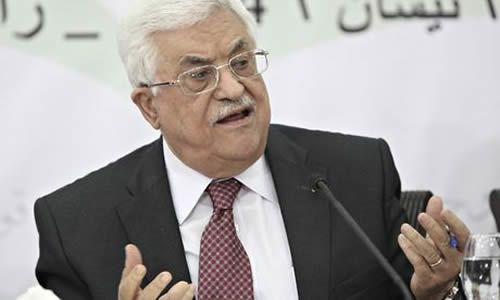Palestinian president reaches out to Israeli public opinion with US-backed peace deal on the verge of collapse
Israel suspended negotiations in response to a reconciliation deal between Mahmoud Abbas (above) and Hamas
The Palestinian president, Mahmoud Abbas, has called the Holocaust the most heinous crime in modern history , in a rare acknowledgement by an Arab leader of Jewish suffering during the Nazi genocide as Israel began its annual commemoration of the event.
In a statement published in English, Spanish and Arabic on Wafa, Palestine's official news agency, Abbas expressed sympathy with the families of the Jewish victims and other victims of the Nazis.
"The Holocaust is a reflection of the concept of ethnic discrimination and racism which the Palestinians strongly reject and act against," said Abbas, describing Nazi atrocities as "the most heinous crime to have occurred against humanity in the modern era". He added: "The world must do its utmost to fight racism and injustice in order to bring justice and equality to oppressed people wherever they are."
The comments, which coincided with Holocaust Remembrance Day, appeared to be aimed at reaching out to Israeli and international public opinion as the latest US attempt to broker an Israeli-Palestinian peace deal nears collapse. They came just days after the signing of a landmark reconciliation agreement between Abbas and his political rival, the Islamist group Hamas. That deal, which could end a seven-year split between the governments of Gaza and the West Bank, has led to widespread Israeli criticism due to Hamas's longstanding refusal to recognise the state of Israel.
Hamas leaders tend not to acknowledge the Holocaust and, in 2009, there were protests in the Gaza Strip over textbooks that discussed it. Such views have made the US and some EU nations wary of continuing to fund a Palestinian government that includes the militant group. On Saturday, Abbas used an address to the Palestine Liberation Organisation to argue that a unity government would be based on his own political platform, not that of Hamas.
Michael Stephens of the Royal United Services Institute for Defence and Security Studies in Qatar said: "Clearly Abbas is also trying to strengthen his position vis-a-vis Hamas and looking to gain as much American backing as possible by sounding the right notes."
A senior PLO official dismissed the link between the timing of the announcement and the recent reconciliation between Fatah and Hamas. He pointed out that Abbas's comments came after American rabbi Marc Schneier – who heads the Foundation for Ethnic Understanding – visited his Ramallah headquarters last week.
"It is just another sincere statement on this issue, and what better day than the Holocaust Remembrance Day? If it was in June, this statement would have come June. This is a consistent statement [from President Abbas]," he said.
The Israeli prime minister, Binyamin Netanyahu, was dismissive of the Palestinian president's comments, and reiterated his view that Abbas had to choose between peace with Hamas and peace with Israel. "President Abbas can't have it both ways. He can't say the Holocaust is terrible but at the same time embrace those who deny the Holocaust and seek to perpetrate another destruction of the Jewish people," Netanyahu said on CNN.
"I think what President Abbas is trying to do is to placate western public opinion that understands that he delivered a terrible blow to the peace process," he added.
The deadline for the peace process sponsored by US secretary of state John Kerry comes on Tuesday, by which time Israel and the Palestinians are due to agree to a framework for further talks.
The stalemate came after Israel failed make good on its promise to release a batch of Palestinian prisoners, and in response Abbas signed a series of agreements with the UN that could pave the way for a renewed bid for Palestinian statehood. But in his statement, Abbas urged Israel to use Holocaust Day to commit to peace with the Palestinians.
"The Palestinian people, who suffer from injustice, oppression and denied freedom and peace, are the first to demand to lift the injustice and racism that befell other peoples subjected to such crimes," he said.
"On the incredibly sad commemoration of Holocaust Day, we call on the Israeli government to seize the current opportunity to conclude a just and comprehensive peace in the region, based on the two-state vision, Israel and Palestine living side by side in peace and security."
Stephens of RUSI said that recent moves by Abbas put the onus on the Israelis in advance of deadline. "Abbas appearing conciliatory puts the ball firmly back in Israel's court, in effect requiring some gesture in return from the Israelis."
Abbas has been criticised by senior political figures in Israel in the past for his earlier views on the Holocaust. His dissertation for his 1983 doctorate was titled: The Other Side: The Secret Relationship Between Nazism and Zionism.
Although Abbas has distanced himself from these views on a number of occasions, most recently in a 2011 interview with Haaretz, Israel's foreign minister Avigdor Lieberman branded Abbas a Holocaust denier in an interview last year.
"Abbas's book in which he denies the Holocaust is on the bookshelf in my office. I do not recall that any of those who welcomed the peace process reminded Abbas of his denial of the Holocaust, which he continues to do in media interviews," said Lieberman.
Hamas has also aimed to distance itself from Holocaust denial in recent years. Writing in the Guardian in 2008, Bassem Naeem, a Hamas minister, claimed that neither Hamas nor the Palestinian government in Gaza denies the Holocaust.
"The Holocaust was not only a crime against humanity but one of the most abhorrent crimes in modern history," he wrote. "We condemn it as we condemn every abuse of humanity and all forms of discrimination on the basis of religion, race, gender or nationality."
